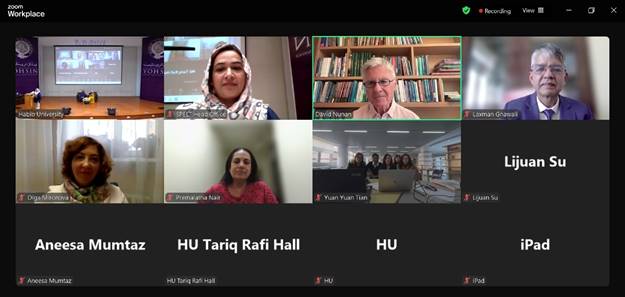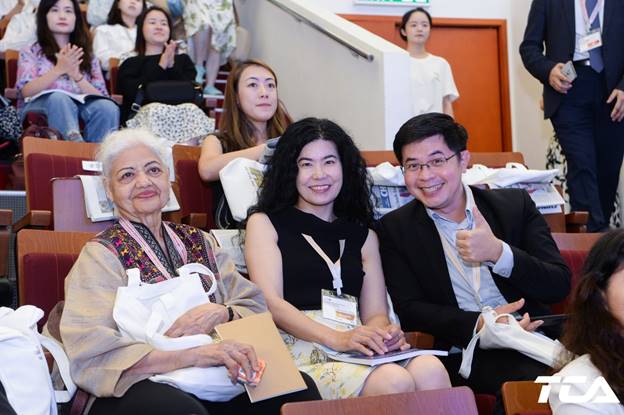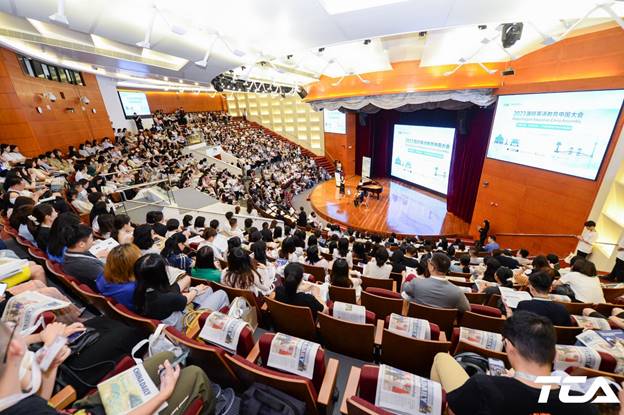Sixth Global English China Assembly panel discussion on ‘Communicative language teaching revisited: Stories from the classroom, teacher development, research and scholarship, and beyond’: (L to R) Prof Lin Pan, Beijing Normal University China; Prof David Nunan, University of Hong Kong China and Anaheim University US; and David Block, ICREA Research Professor at Universitat Pompeu Fabra Spain - Photo courtesy 21st Century English Education China Daily
A Network of English Language Teachers Connect People Like the Silk Road Once Did
(An 85-year-old teacher and researcher from Pakistan reflects on her journeys to China for two conferences. The one in Macau enabled her to meet a long-lost cousin from Mumbai in Hong Kong. The one in Beijing catalyzed a research project currently being replicated by researchers in six countries, presented at the SPELT 40th annual international conference in Karachi recently)
By Zakia Sarwar / Sapan News
China has always fascinated me. The ‘land of opium eaters’ is also the land of wisdom enriched by Confucius, of delicate and intricate art and music, of graceful but complicated nuances of culture, and a difficult system of language and script that I wouldn’t even dream of mastering.
So I was thrilled when SPELT , the Society of Pakistan English Teachers that I co-founded 40 years ago, nominated me as a featured speaker for the Sixth Global English China Assembly in Macau in July 2023. Interestingly, it was not a teachers’ organization which organized this conference, but China’s most widely circulated English-language newspaper, the China Daily.
A few months later, in November I had the opportunity to travel to China again, this time for a conference in Beijing, organized by the Belt and Road Language and Culture Network, under the umbrella of China’s Belt and Road initiative.
The lure of meeting new colleagues and seeing how a conference is organized in China spurred me on despite the challenges – outlined by my son when I discussed the Macau conference with him.
“A long flight to mainland China and then a dicey connecting flight to Macau which has a small airport,” he said, reminding me of my age. “Then into your conference and then fly to Pakistan three days later.”
Cousins reunite
Yes, I often forgot I was 84 (now 85). I felt a bit daunted. If I got stuck somewhere, at a truly ‘foreign’ airport, it would be difficult, especially as most Chinese don’t speak even broken English. A long journey, lugging a suitcase and a carry-on, besides my laptop and purse.
I almost gave up. That evening, a conversation with my nephew in Australia changed everything. “Fly to Hong Kong, there are ferries every half hour to Macau - you don’t need air connections.”
Everything fell into place. I called another nephew in Hong Kong – we South Asians have relatives all over the world! He promised to book me on a ferry - it takes 30 minutes to reach Macau. I could break the journey at his place, leave my suitcase there and go with an overnight bag on the ferry to Macau.
The bonus was that my favourite cousin in Bombay would also be in Hong Kong. My mother had brought her up as a child, so we spent a lot of time together as kids. The India-Pakistan relationship being what it is, I had not seen her since my last visit to India, over 15 years ago.
I stayed in Hong Kong for a couple of days after the conference, spending precious time with Bano, and going down memory lane to delve into our shared past which has a bittersweet taste of its own.

Panelists taking part in a SPELT zoom session in Karachi, Pakistan at the Sixth Global English China Assembly. Screenshot
We remembered one Moharram when we were all at our Nana’s haveli and Imambara in a little village called Bhadarsa - but the sign at the railway station proclaimed its name as Bharatkund. How did it become Bhadarsa for us?
Being together made me reflect on how so many of us in India and Pakistan are deprived of the enjoyment of sharing our memories with our loved ones, which could provide solace and support in today’s world of stress and complications.
After getting dropped off at the ferry dock the next morning, I walked through the spartan corridor with ropes for single lines, leading to two desks. Somebody pointed me to the farthest desk for Macau. I showed my ticket.
“No ferries to Macau today,” said the young man behind the counter.
“I have come for a conference. I have to go to Macau.”
“Ferry take you to next dock – Taipa. You take bus to Macau from there,” he said decisively.
“But my hosts are receiving me at Macau dock. Can you contact them and tell them to go to Taipa?”
I pulled out the phone numbers of the conference volunteers designated to pick me up at Macau. The young man tried unsuccessfully to connect the number through my phone and his own. I didn’t find the net connections very efficient. Visitors can’t access the local equivalent of WhatsApp.
The young man tried to convince me that my only option was to go to Taipa and take a ‘free bus’ to Hotel Artyzan.
I held my ground. I was a senior citizen. I had travelled far to attend a conference in Macau. It was my first time in China. I could not land on an unfamiliar island without someone to ensure I reached my destination safely.
Finally, he called his supervisor, a man with grizzled hair and a pleasant face, who also spoke English.
“Where are you from?” he asked.
“Pakistan.”
“Oh, Pakistan is our friend! I’ll help you, Ma’m….. you are so beautiful!” he said cordially. “Please can you just give me 5 minutes to sort this out?”
He reverted to me. “OK, Ma’m, I’ve arranged our Turbo Jet Company’s car to pick you up when you land in Taipa. The driver will take you straight to your hotel.”
I looked doubtful. “How will the driver know me?”
He showed his mobile screen - he had taken my photo! “The driver has this!”
The sparse but functional exit lounge was packed with families traveling to Taipa but quiet despite the children around. An official removed the barrier to the ferry passage. The queue was long, but there was no rush, no pushing.
The sea was calm. As the ferry moved, I could see many bridges connecting Hong Kong to Macau and other smaller islands. The Chinese have excelled in making bridges over the seas.
At Taipa, I moved hesitantly with the crowd towards the exit. A young man approached me, bowing courteously. He motioned me to a car waiting by the curb. Sliding into the seat I read out the hotel’s address, and the driver nodded. He already knew. Within half an hour we pulled up at the hotel.
‘Welcome Professor’
Several volunteers held a placard “Welcome Prof Sarwar!” The girls hugged me and helped me with my luggage. I felt so relieved to have reached my destination.
At a familiar-looking registration desk, someone handed me a conference bag with ‘goodies’ - one of the many norms of an international conference that were observed throughout, often with a local or personal touch.
Soothing live soothing music greeted participants as we joined the inaugural program and settled into our seats. Surprisingly, several guest speakers addressed the hall in Chinese. The academic program and logistics were organized most effectively, all details were well worked out.
The Macau University volunteer students team worked seamlessly, with grace and courtesy to the overseas presenters, disbursing lunch packs, and guiding participants to different rooms for their presentations.
The China Daily organized this hybrid event – “2023 Global English Education China Assembly” with support
from the Shanghai International Studies University, co-

Professor Zakia Sarwar (left) with international friends at the Sixth Global English China Assembly
hosted by Macau Specially Administered Regions - Government Education & Youth Development Bureau, with City University Macau, and China Daily’s 21 st Century English Education Media.
‘World Englishes’
Started in 2018, this was the sixth annual event being held at the scenic Macau University Campus. The theme of the conference was “New Opportunities for the World with New Advances in China’s Development: Opening Up New Prospects in English Education Cooperation Worldwide.”
Over 1,600 teachers from all over China, English language teachers and ELT experts from 20 countries like USA, UK, New Zealand, Australia, Italy, Thailand, Russia, Singapore, Nepal, Indonesia, Mongolia and Pakistan participated in this mega event.
At the Beijing conference in November last year, I participated in a panel discussion along with Hong Kong-based Prof David Nunan, an Australian and ELT ‘guru’, shared his professional journey and insights on shaping English language teaching in today’s world.
>>EMBED VIDEO: https://drive.google.com/file/d/1qNBeYhOfeQ9wcuZ13DTFR1_S4qZ...
CAPTION > Video: Zoom session at SPELT 40th Annual International Conference in Karachi, Pakistan

Music performance at the Sixth Global English China Assembly: Inaugural session. Photo courtesy 21st Century English Education China Daily
I had met Prof Nunan in the late 1980s in Japan when I interviewed him for the SPELT Journal. He had talked to me about Action Research, then a brand new idea – teachers can do Action Research for a week and move on to the next cycle. This is an idea I’ve taken forward with my research.
My presentation was on “Empowering English as a Foreign Language (EFL) Learners to Become Proficient Users of English” where I shared some successful strategies I’ve developed during my classroom action research since 1983.
In my experience, English as a foreign language or EFL learners are as smart as learners whose mother tongue is English. Unfortunately, they are caught in a vicious circle. They do not realize that they do not need to speak like the Americans, Australians or the British. The ‘native speakers’ of English are in a minority, so English actually belongs to EFL users.
Singaporean, Chinese, Indian, Pakistani, Arabic – in fact all varieties of English are acceptable as part of ‘World Englishes’ as long as they serve the communicative purpose of language.
I ended my presentation with a video clip of two young men from the interior of Sindh. One had written a love song in English, with some incorrect grammar, following the Urdu poetic tradition of using the poet’s name in the last couplet. The other sang the song with gusto using the traditional Sindhi instrument Ek Tara to a Sindhi tune—and pure Sindhi intonations. However, it is clear he was happy singing his friend’s love song in English. They both took ownership of English and communicated effectively.
In the course of three days, there were nine keynote speakers who shared their thoughts on a variety of topics. The online closing keynote by Stephan Krashen focused on "‘Study’ versus Pleasure Reading" which enables language learners to learn English in a non-threatening way.
There were over a hundred presentations in parallel sessions, by Chinese teachers from schools, colleges, and universities.
At the Beijing conference, it was exciting to meet colleagues from 13 countries with similar issues of teaching English as a Foreign Language.
As some of us informally shared our teaching situations and then lamented the dire need for research in EFL settings, we agreed that writing and oral skills are the biggest challenges for EFL learners.
Our conversations sparked off a low cost/no cost, teacher-initiated task-based project that I proposed that addresses both issues. It requires minimal preparation and no funding -- just the courage to try it in class, making it an example of good teaching and action research.
I have conducted this simple Research Task successfully in my classes that requires only an understanding of the concepts behind the task. It needs minimal preparation, some virtual coordination, and no training or funding. It only requires teachers to have the courage to try it in class with their learners to see how it works for them. That is what good teaching is, and what Action Research is all about
This innovative, but practical and doable English language task is now being replicated by researchers of six EFL countries – Bangladesh, China, Malaysia, Nepal , Pakistan, and Russia. The project researchers range from PhDs to school teachers who have been working with secondary to post-graduate level learners and even trainee teachers. They are all equally excited about it as the researchers explore what will or will not work out in their classrooms.
Over the past year, we have come together across time zones and continents to conduct small-scale action research, exploring if learners perform better in English when given supportive classrooms and meaningful tasks. The Research Task involves just 10 minutes of practice per class over 10-12 weeks, totaling 10 contact hours.
This is not the space to go into the logistics of how it is organized, or its current status. That is a story we hope to share after the project is completed.
I would like however to acknowledge the China Daily invitation which enabled us to meet and network, which led to this Collaborative Research. It would not have been possible without the encouragement of Prof David Nunan and Dr Rubina Khan, President of the Bangladesh English Language Association. Like EFL learners, EFL researchers also need support.
( Zakia Sarwar is a prominent English language teaching expert who co-founded the Society of Pakistan English Language Teachers in Karachi 1984 and has conducted groundbreaking research on teaching large classes with limited resources as well as teaching English as a foreign language. - Sapan News)

